· Zen HuiFer · Learn · 需要11 分钟阅读
Daily GitHub Exploration | 9 Must See Open Source Projects to Improve Your Programming Skills
Explore top GitHub projects for September 2024: Boost coding skills with Java algorithms, Rust exercises, and more. Discover ML, low-code platforms, and browser-based LLM inference.

Daily GitHub Exploration | 9 Must See Open Source Projects to Improve Your Programming Skills
This article selects 9 useful open-source projects on GitHub that should not be missed, covering algorithms, model inference, machine learning, application building, data management, and language detection, aiming to help developers improve their programming skills.
1. Complete Guide to Java Algorithms
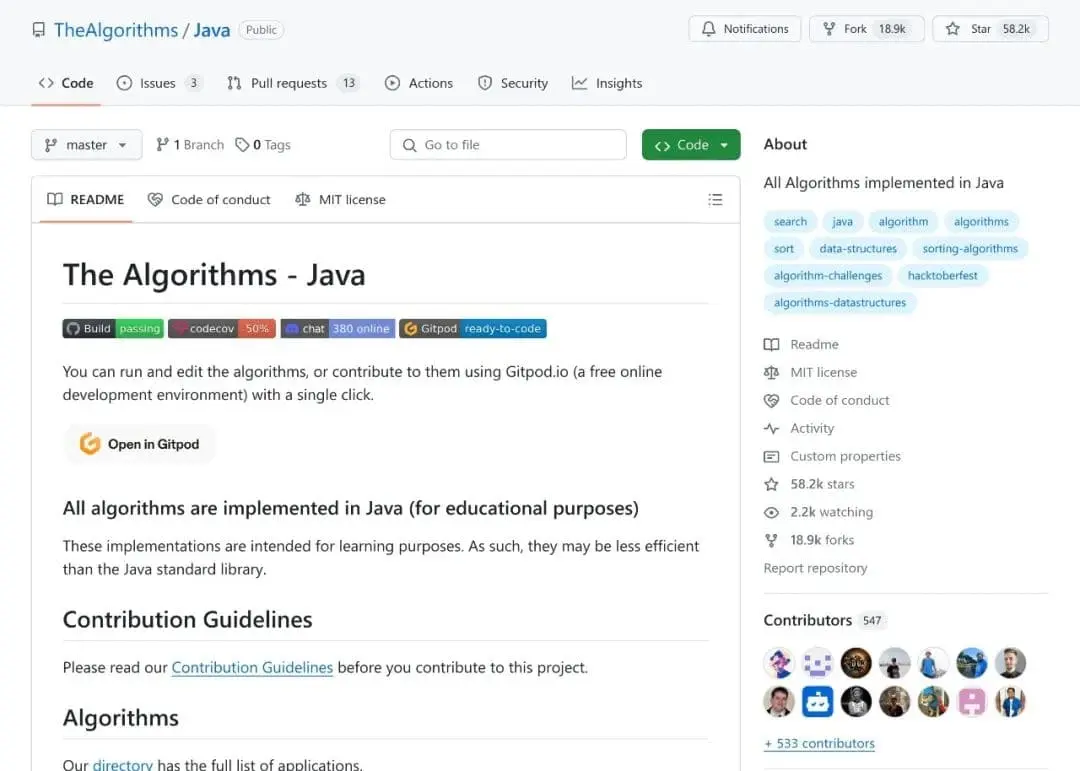
🏷️ Warehouse name:TheAlgorithms/Java
🌟 Number of stars as of publication deadline:58948(New additions today: 23)
🇨🇳 Warehouse language:Java
🤝 Warehouse Open Source Protocol:MIT License
🔗 Warehouse address:https://github.com/TheAlgorithms/Java
introduction
This article aims to provide readers with in-depth insights into the Java algorithm repository on GitHub, which gathers a large number of algorithms implemented in the Java language.
Project function
This repository contains a wide range of algorithm collections, covering from basic sorting and search algorithms to more advanced data structures and optimization techniques. All algorithms are carefully annotated for easy understanding and use. The warehouse also provides an interactive environment that allows users to run and edit algorithms, promoting practical learning.
Warehouse Description
The algorithms in the warehouse are organized by category, including sorting, searching, data structures, and graph algorithms. Each algorithm comes with a clear description, time complexity analysis, and code examples. The warehouse also includes a detailed directory for users to easily search for specific algorithms.
case
This warehouse is widely used for educational and research purposes. It is used in university courses as a teaching aid for algorithm principles and Java programming.
Objective evaluation or analysis
The Java algorithm repository has been widely praised for its comprehensiveness and ease of use. It provides a rich set of algorithms suitable for programmers with different skill levels. The interactive nature of the warehouse provides valuable practical experience and enhances understanding of algorithms.
Usage suggestions
This warehouse is very suitable for the following groups of people:
Beginners who want to learn or review algorithms
Programmers who hope to enhance their Java programming skills
Individuals who require algorithm implementation for research or projects
conclusion
The Java algorithm repository is a valuable resource that provides rich learning and practical opportunities for individuals interested in algorithms. It gathers a wide range of algorithm collections, providing clear documentation and interactive experiences, making algorithm learning and implementation easy.
2. Torchao: PyTorch architecture optimization
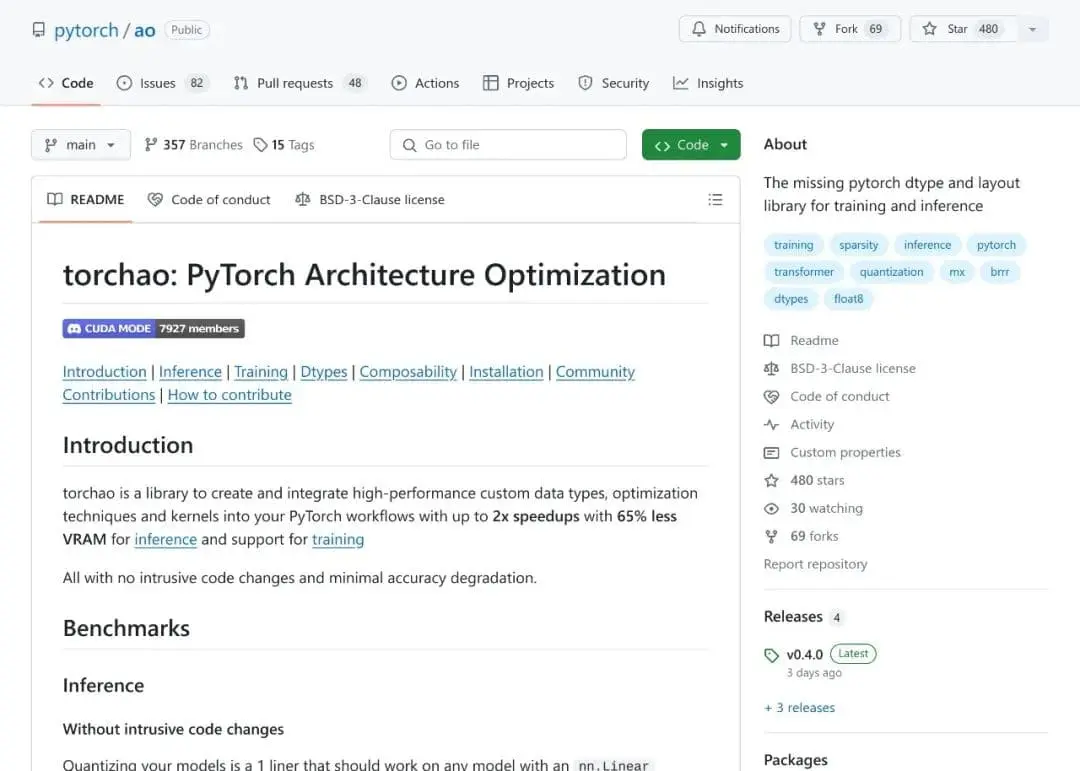
🏷️ Warehouse name:pytorch/ao
🌟 Number of stars as of publication deadline:1098(New additions today: 59)
🇨🇳 Warehouse language:Python
🤝 Warehouse Open Source Protocol:BSD 3-Clause “New” or “Revised” License
🔗 Warehouse address:https://github.com/pytorch/ao
introduction
This article introduces Torch, a library for PyTorch that allows models to be quantified and sparsified through custom data types and optimizations.
Project function
Torchao provides an easy-to-use API that allows users to optimize PyTorch models using a set of quantization and sparsification strategies, including:
Weight quantification: Convert floating-point weights to low bit depths (such as int8, int4) to reduce memory usage and computational costs.
Activation quantification: Quantify the activation in the model to further improve speed and memory efficiency.
Gradient quantization: Quantify gradients to optimize backpropagation.
Optimizer quantification: Use low depth data types to compress optimizer state and reduce memory usage.
Sparse training: Sparse model weights to reduce model size and computational costs.
Warehouse Description
The Torchao project repository contains the following content:
A set of pre built quantization and sparsity methods
Custom kernel support
Seamless integration with other PyTorch ecosystem components
Detailed documentation and tutorials
case
Torchao has been successfully applied to various PyTorch models, such as:
**Hugging Face Transformers:**Implemented post inference quantization and low-level depth optimizer to accelerate inference.
**Hugging Face Diffusers:**Provides best practices for optimizing image diffusion models using PyTorch compiler and Torchao.
Objective evaluation or analysis
Torchao significantly improves the inference and training efficiency of the model, with specific performance improvements varying depending on the model and optimization strategy. For example:
By using post training quantization, the token/second speed of the GPT Fast model can be doubled, while reducing the demand for VRM by about 65%.
Using floating-point 8 training can achieve up to 1.5 times throughput acceleration in LLaMa 3 70B pre training tasks.
Using sparse training and optimizer quantization can provide a 6% end-to-end speed improvement for ViT-L models.
Usage suggestions
Torchao can be used in various application scenarios, such as:
Inference optimization: Reduce model size and memory usage through quantization and sparsity.
Training optimization: Improve model training speed and efficiency.
Hardware acceleration: Utilize the optimized model of Torchao to fully leverage the advantages of specific hardware.
conclusion
Torchao is a powerful PyTorch library that provides various custom data types and optimization options that can significantly improve the inference and training performance of models. It seamlessly integrates with the PyTorch ecosystem, providing users with a simple and effective way to optimize their models.
3. Practice item by item and learn Rust
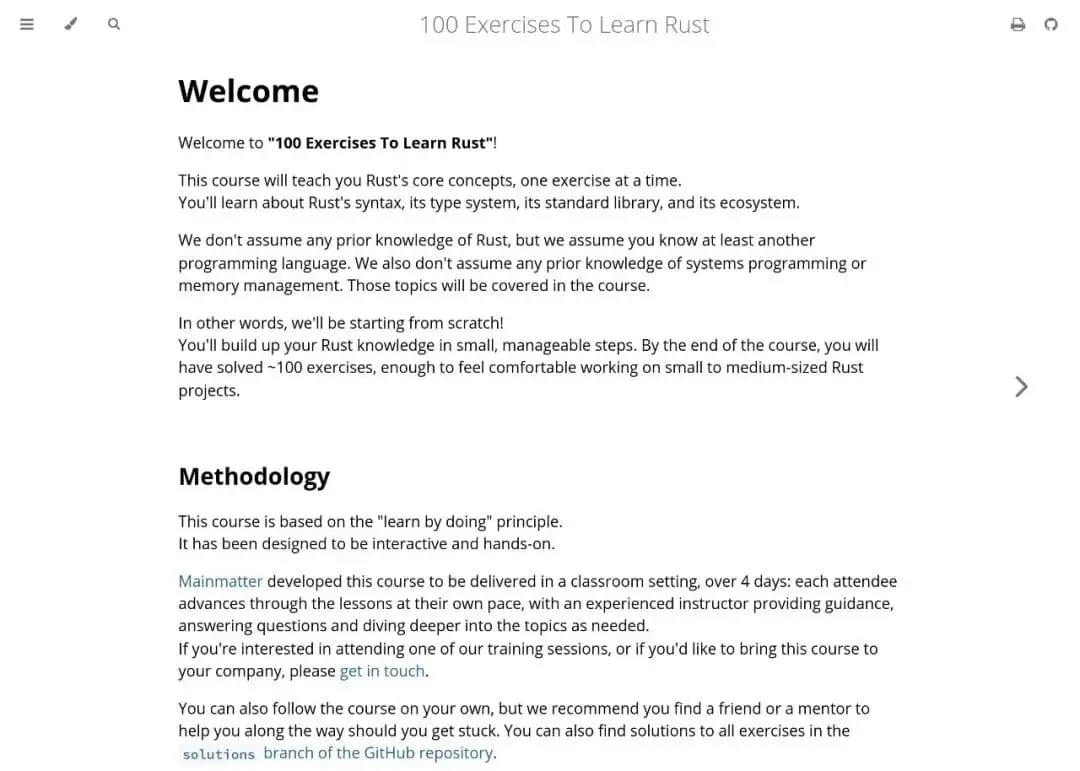
🏷️ Warehouse name:mainmatter/100-exercises-to-learn-rust
🌟 Number of stars as of publication deadline:4588(Added today: 322)
🇨🇳 Warehouse language:Rust
🔗 Warehouse address:https://github.com/mainmatter/100-exercises-to-learn-rust
introduction
If you have heard of Rust but haven’t had the chance to try it out, then this course is perfect for you!
Project function
This course is written by Mainmatter and is one of the trainings in the Rust seminar training package.
Warehouse Description
This repository contains 100 exercises designed to help learners gradually master Rust.
Usage suggestions
Visit rust-exercises.com and follow the instructions to start learning.
Install Rust and ensure that it is running the latest stable version.
Consider using an IDE that supports Rust auto completion, such as RustRover or Visual Studio Code with Rust analyzer extensions.
conclusion
By completing the exercises in this course, you can gradually become a Rust developer capable of writing your own programs from a beginner in Rust.
4. Language expert: GitHub language detection and analysis tool
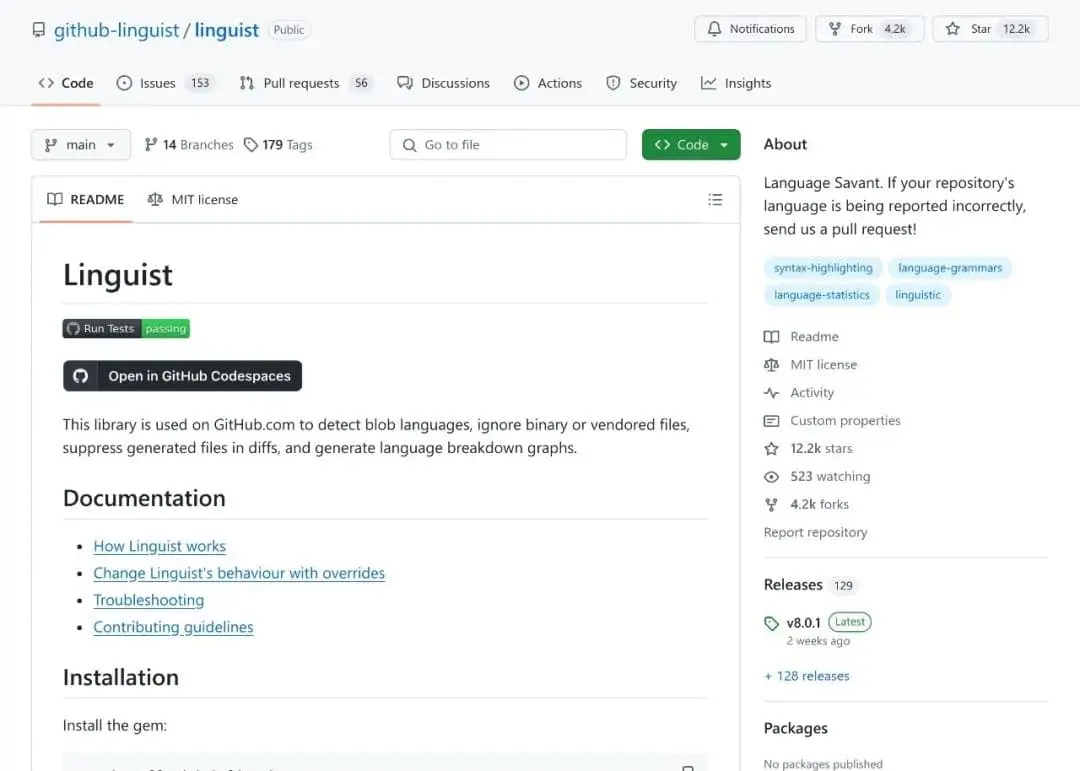
🏷️ Warehouse name:github-linguist/linguist
🌟 Number of stars as of publication deadline:12186(Added today: 4)
🇨🇳 Warehouse language:Ruby
🤝 Warehouse Open Source Protocol:MIT License
🔗 Warehouse address:https://github.com/github-linguist/linguist
introduction
Language Expert is a Ruby library and command-line tool used on GitHub.com to identify programming languages, manage ignored or suppressed files, and provide language related insights.
Project function
Language experts use rule-based methods to detect language and identify patterns and features in code files. It also analyzes file headers, comments, and other contextual information to improve accuracy.
Warehouse Description
The GitHub repository for language experts hosts the source code for libraries and command-line tools. It includes a rich language syntax that defines rules for detecting specific programming languages.
case
For example, language experts’ analysis of the official Ruby on Rails repository shows that Ruby accounts for 65% of the codebase, followed by JavaScript, CSS, and HTML.
Objective evaluation or analysis
Language experts are very accurate in detecting commonly used programming languages. Its extensive grammar database covers over 300 languages and provides comprehensive language recognition.
Usage suggestions
Developers can use language experts to:
Identify the language used in the code repository
Track language trends over time
Optimize code quality by detecting potential language specific issues
Enhance code readability through syntax highlighting
conclusion
Language experts are an indispensable tool for GitHub users, developers, and data scientists. Its accurate language detection and analysis capabilities provide valuable insights for code repositories, supporting efficient code management, understanding language usage, and overall software development.
5. ToolJet: Low Code Application Building Platform
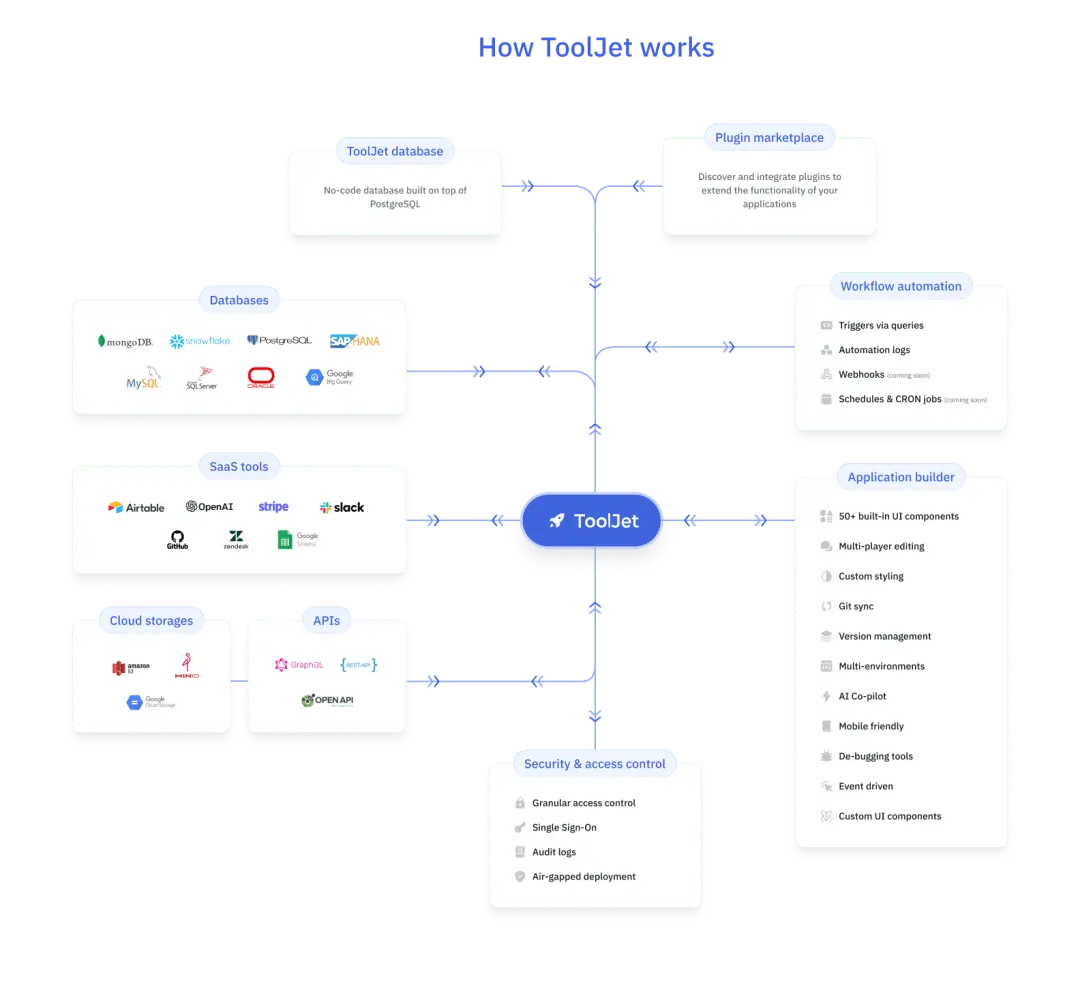
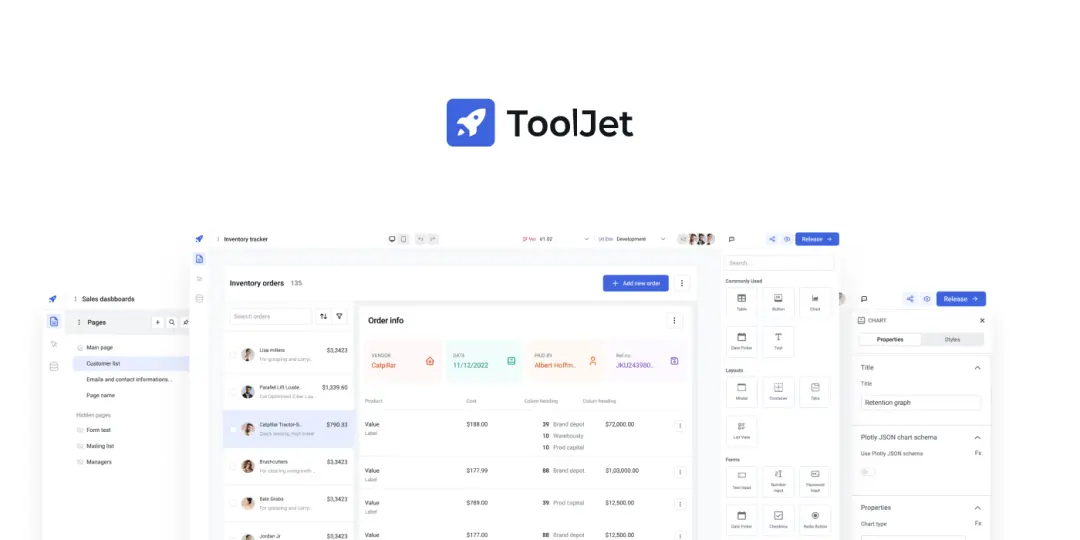
🏷️ Warehouse name:ToolJet/ToolJet
🌟 Number of stars as of publication deadline:29063(Added today: 30)
🇨🇳 Warehouse language:JavaScript
🤝 Warehouse Open Source Protocol:GNU Affero General Public License v3.0
🔗 Warehouse address:https://github.com/ToolJet/ToolJet
introduction
ToolJet is an open-source low code framework that can be used to build and deploy internal tools with minimal engineering effort. ToolJet’s easy-to-use drag and drop front-end builder allows you to create complex and responsive front-end in minutes.
Project function
ToolJet is built using JavaScript/TypeScript and utilizes Node.js and React.exe as its backend and frontend frameworks. It provides the following core functions:
Visual Application Builder
Built in no code database
Extensive data source integration (including databases, cloud storage, APIs, and SaaS tools)
Desktop and mobile device responsive
Self hosting and cloud hosting options
Granular access control
Warehouse Description
This repository contains the source code, documentation, and examples of ToolJet.
case
ToolJet has been used to build various applications such as inventory management, customer relationship management (CRM), and project tracking systems.
Objective evaluation or analysis
ToolJet is a powerful low code platform that provides ease of use, scalability, and security for building internal applications. It reduces development time and costs, while allowing non-technical personnel to participate in the application development process.
Usage suggestions
ToolJet is suitable for the following scenarios:
Quickly build and deploy internal applications
Automated repetitive business processes
Innovative experiments and prototype design
Enhance the participation and collaboration of non-technical personnel
conclusion
ToolJet is an excellent low code platform that provides businesses with the ability to quickly and easily build and deploy customized applications. It is easy to use, feature rich, and scalable, making it an ideal solution for enterprises seeking automation and simplified operations.
6. WebLLM: High performance LLM inference engine within the browser
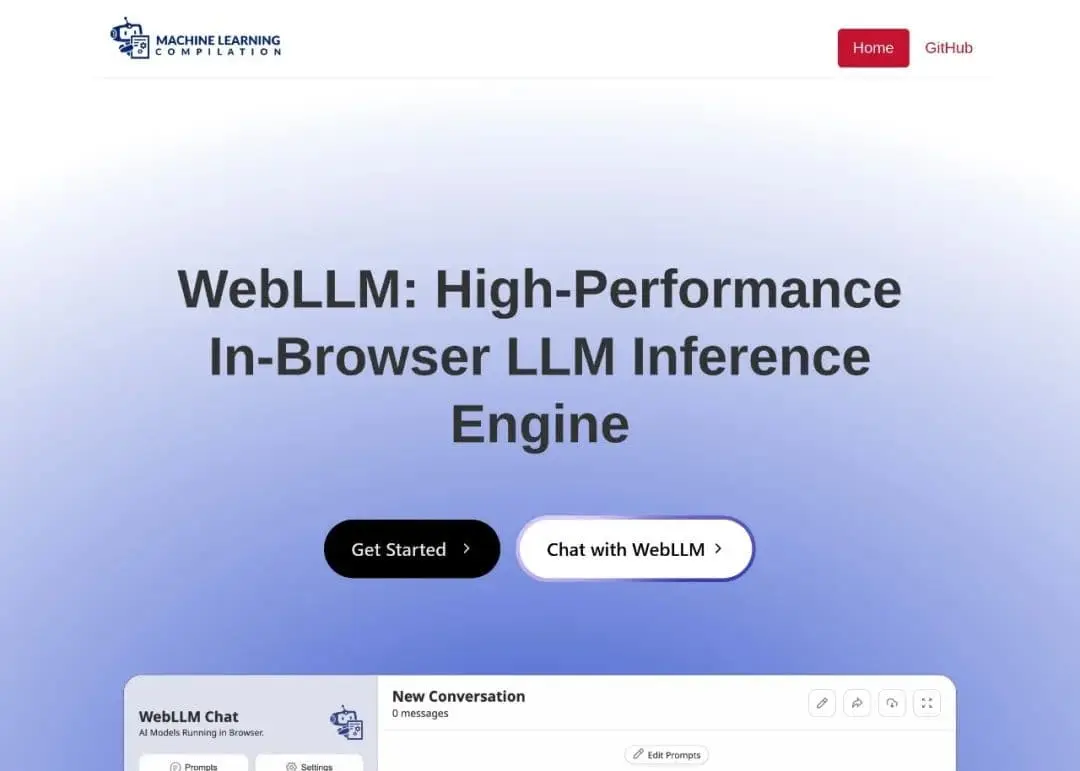
🏷️ Warehouse name:mlc-ai/web-llm
🌟 Number of stars as of publication deadline:12992(Added today: 123)
🇨🇳 Warehouse language:TypeScript
🤝 Warehouse Open Source Protocol:Apache License 2.0
🔗 Warehouse address:https://github.com/mlc-ai/web-llm
introduction
This article introduces WebLLM, a high-performance browser LLM inference engine that directly introduces language model inference into browsers with hardware acceleration capabilities.
Project function
WebLLM utilizes WebGPU for hardware acceleration, running all operations within the browser without the need for server support. It is fully compatible with OpenAI API and supports features such as streaming processing, JSON schema, and function calls.
Warehouse Description
WebLLM includes:
Built in models: Llama, Phi, Gemma, Mistral, Qwen, etc
Fully compatible with OpenAI API
Advanced usage: Optimize using Worker, Service Worker, Chrome extensions
case
WebLLM Chat: A chatbot application built using WebLLM
Objective evaluation or analysis
WebLLM provides the following advantages:
Efficiently infer LLM within the browser without the need for a server
Fully compatible with OpenAI API, providing rich functionality
Wide built-in model support
Scalable, supports custom model integration
Usage suggestions
WebLLM can be used for various applications, including:
Chatbot
Language Translation
Text Summary
code generation
Education and Research
conclusion
WebLLM is a powerful tool that allows developers to build LLM based applications within the browser. Its high performance, compatibility with OpenAI API, and wide range of features make it a valuable resource for artificial intelligence application developers.
7. MLflow: Machine Learning Lifecycle Platform
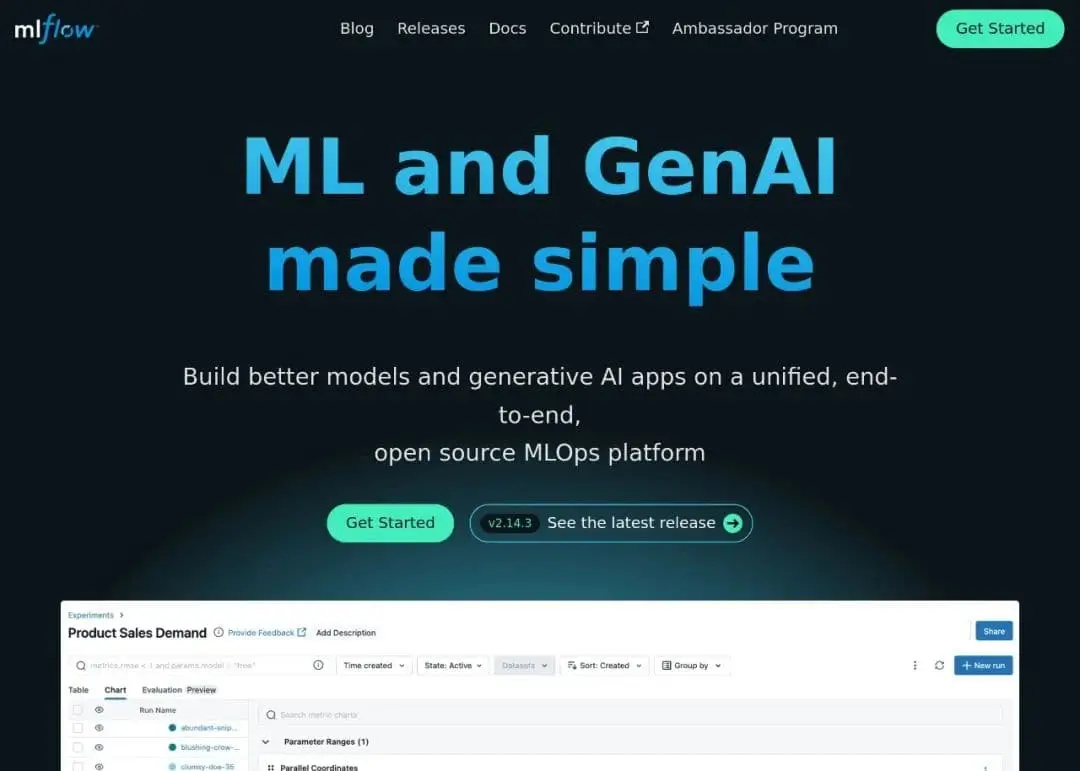
🏷️ Warehouse name:mlflow/mlflow
🌟 Number of stars as of publication deadline:18427(Added today: 7)
🇨🇳 Warehouse language:Python
🤝 Warehouse Open Source Protocol:Apache License 2.0
🔗 Warehouse address:https://github.com/mlflow/mlflow
introduction
MLflow is a platform designed to simplify machine learning development, including tracking experiments, packaging code into repeatable units, and sharing and deploying models.
Project function
The current components of MLflow include:
MLflow tracking: An API used to record parameters, code, and results in machine learning experiments and compare them using an interactive UI.
MLflow project: A reusable code packaging format using Conda and Docker, allowing you to share your ML code with others.
MLflow model: A model packaging format and tool that allows you to easily deploy the same model (from any ML library) to platforms such as Docker, Apache Spark, Azure ML, and AWS SageMaker for batch processing and real-time scoring.
MLflow model registry: A centralized model storage, API, and UI for collaborative management of the complete lifecycle of MLflow models.
Warehouse Description
MLflow aims to accelerate the machine learning lifecycle by providing the following features:
Track experiments to compare runs and models
Package code for repeatable execution and collaboration
Automated deployment of models from development to production
Collaborate to manage the entire lifecycle of a model in one place
conclusion
MLflow is an essential tool that helps data scientists and machine learning engineers efficiently manage their machine learning lifecycle. By providing a wide range of features, MLflow can help you improve model performance, enhance interpretability, and accelerate model deployment.
8. Algorithm in Python
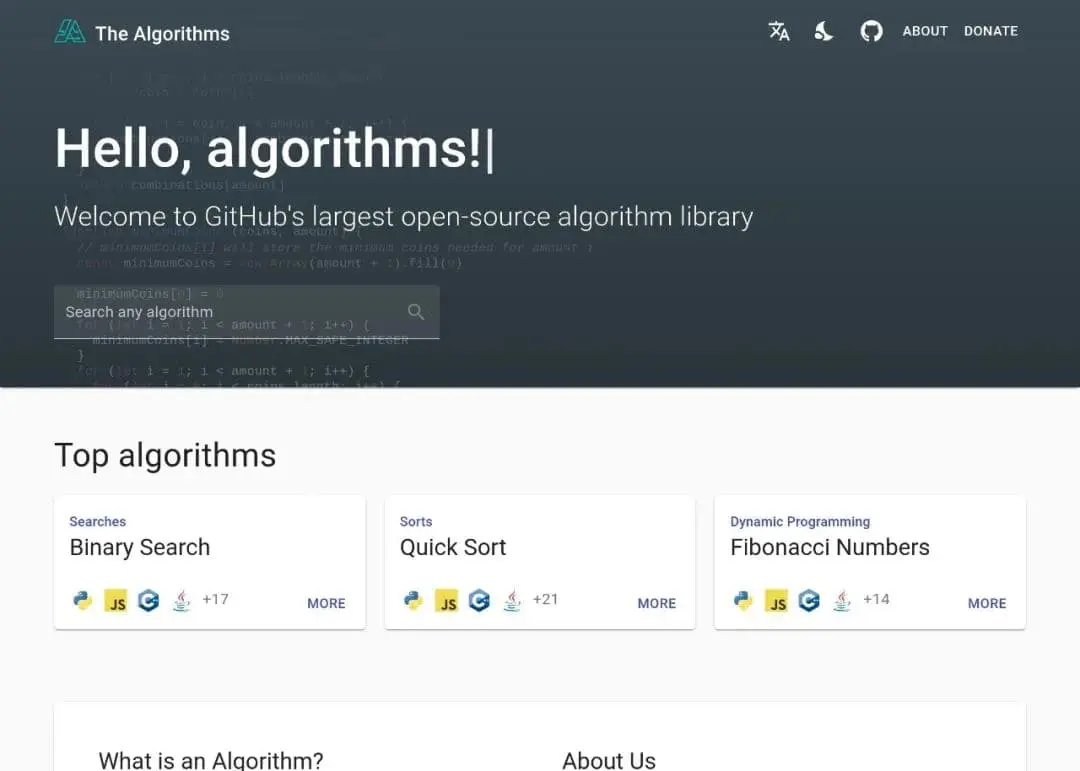
🏷️ Warehouse name:TheAlgorithms/Python
🌟 Number of stars as of publication deadline:184750(Added today: 55)
🇨🇳 Warehouse language:Python
🤝 Warehouse Open Source Protocol:MIT License
🔗 Warehouse address:https://github.com/TheAlgorithms/Python
introduction
This article will delve into the “Algorithm in Python” repository, focusing on its role, technical analysis, case studies, and usage recommendations.
Project function
This repository contains Python implementations of various algorithms, including quicksort, binary search, and dynamic programming. These implementations are mainly used for educational purposes and may be less efficient compared to implementations in the Python standard library. The code in the repository follows a concise and readable style, making it easy for readers to understand and use.
case
This repository provides examples of various algorithms, such as quicksort, binary search, and dynamic programming. These examples demonstrate how algorithms can be applied to practical problems.
Objective evaluation or analysis
The ‘Algorithm in Python’ repository is a valuable resource that provides convenience for learning and practicing algorithms. It includes a wide range of algorithm implementations and is written in a clear and concise manner. This warehouse can also serve as a valuable tool for participating in hackathons and technical interviews.
Usage suggestions
This repository is most suitable for Python developers who wish to learn and practice algorithms. It can also serve as an auxiliary tool for solving programming challenges and improving programming skills.
conclusion
The ‘Algorithm in Python’ repository is a comprehensive resource that provides a convenient way to learn and practice algorithms. Its extensive implementation, clear documentation, and active community make it an important tool for developers.
9. Dagster: Data Pipeline Organization Platform

🏷️ Warehouse name:dagster-io/dagster
🌟 Number of stars as of publication deadline:11263(New additions today: 17)
🇨🇳 Warehouse language:Python
🤝 Warehouse Open Source Protocol:Apache License 2.0
🔗 Warehouse address:https://github.com/dagster-io/dagster
introduction
Dagster is a data pipeline orchestration platform designed specifically for the development, production, and observation of data assets. This article will delve into the role, technical analysis, case studies, and usage recommendations of Dagster.
Project function
Dagster uses Python functions to declare data assets. This platform provides a graphical representation based on a declarative programming model, where assets are represented as nodes and dependencies are represented as edges.
Usage suggestions
To use Dagster, it is recommended to install itdagsteranddagster-webserverSoftware package and follow complete documentation guidelines.